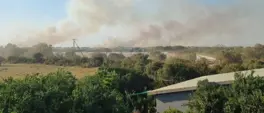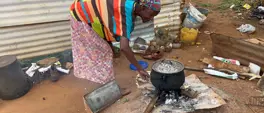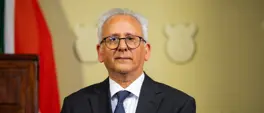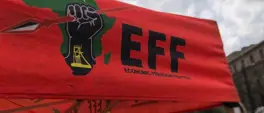ANALYSIS: Global Alliance Against Hunger & Poverty is Brazil G20 presidency's greatest legacy
Malaika Mahlatsi
20 November 2024 | 17:44Malaika Mahlatsi delves into the creation of the Global Alliance Against Hunger & Poverty and how it plans to tackle global hunger and poverty.
The G20 Leaders’ Summit in Rio de Janeiro, Brazil, has ended on a high note, with G20 countries affirming their commitment to the fight against global inequality, poverty and hunger.
This commitment was expressed in the official launch of the Global Alliance Against Hunger and Poverty. The Global Alliance Against Hunger and Poverty was proposed by Brazil’s G20 presidency under Luíz Inácio Lula da Silva, with the aim of establishing a global alliance to gather funds and knowledge towards implementation of public policies and social technologies proven effective in reducing global hunger and poverty.
It is geared towards reversing the setbacks in achieving Sustainable Development Goals 1 (poverty eradication) and 2 (zero hunger and sustainable agriculture). Since the COVID-19 pandemic that devastated national economies, particularly in the Global South, the scourge of food insecurity has increased exponentially. According to a United Nations Food and Agriculture Organization (FAO) report, the number of people suffering from hunger in the world increased by 122 million people in 2022 when compared to 2019.
Given Brazil’s extensive experience and international recognition in income transfer policies and reduction of poverty and inequality through programmes such as Bolsa Família, which benefits more than 55 million people in the country, it stands to reason that the country’s G20 presidency was focused on inequality, hunger and poverty eradication.
The Global Alliance Against Hunger and Poverty will hold regular summits against hunger and poverty and establish a high-level champions council to oversee its work. A lean and efficient technical body, the Global Alliance Support Mechanism, will be hosted by FAO. The body will provide strategic and operational support, also fostering partnerships at the country level to implement initiatives to combat hunger and poverty. Brazil has committed to financing half of the support mechanism's costs through 2030, with additional contributions from countries such as Bangladesh, Germany, Norway, Portugal, and Spain.
It is significant that contributions are coming mainly from the Global North. Some of the world's richest companies from developed regions of the world are raking in bumper profits from the cost-of-living crisis that has disproportionately affected the poor and vulnerable in developing countries.
According to Gordon Brown in an article titled The Global North Must Follow the Global South’s Lead, the largest beneficiaries of this effective tax on the global economy have been petrostates such as Canada, Iran, Norway and Australia, whose total export revenues, totalled almost US$1 trillion in 2022. He argues that the biggest of these countries, whose per capita incomes are among the highest in the world, are well able to pay a voluntary levy on their exceptionally high hydrocarbon-export revenues into a global fund for sustainable development.
Furthermore, hunger and poverty in the developing world is directly linked to the historical and contemporary actions of many of the countries in the Global North. The legacy of colonialism on developing countries has been devastating, with many of them, particularly in Africa, still reeling from centuries of economic disenfranchisement. Colonialism benefitted countries such as Germany, Spain, Portugal and others who have pledged the financing half of the support mechanism of the Global Alliance Against Hunger and Poverty.
In addition to the lasting legacy of colonialism and imperialism, developing countries in the Global South are bearing the brunt of climate change, the outcome of the industrial development of the Global North in particular. In a 2015 study, Ending Poverty and Hunger by 2030: An Agenda for the Global Food System, the World Bank draws a direct link between climate change and rising poverty in the developing world. The report contends that the impacts of climate change places additional pressures on natural resources, further worsening conditions in poorer regions of the world. And as the food system operates across many sectors and touches upon many aspects of society, improvements in its operations that help end hunger, such as those proposed by the task force of the Global Alliance Against Poverty and Hunger, can also contribute to ending extreme poverty. It is a form of justice for developing countries that are paying the price for the economic growth of rich nations.
Having been officially launched, the Global Alliance Against Hunger and Poverty will now operate as an independent global platform, with continued support from future G20 presidencies. The entire governance structure, including the champions council and the support mechanism, is expected to be operational by mid-2025. Until then, Brazil will provide interim support for essential functions such as communications and approval of new members.
Speaking at the launch, President Lula da Silva stressed that hunger and poverty were not the result of scarcity or natural phenomena. He contended that in a world where military spending amounts to 2.4 trillion dollars, global hunger was unacceptable. There is no question that the launch of the Global Alliance Against Hunger and Poverty, which is open to countries outside the G20, is the most defining legacy of Brazil’s G20 presidency.
Malaika Mahlatsi is a researcher and geographer at the Institute for Pan African Thought and Conversation. She is providing analysis from the G20 Leaders’ Summit in Rio de Janeiro, Brazil.
Get the whole picture 💡
Take a look at the topic timeline for all related articles.

















